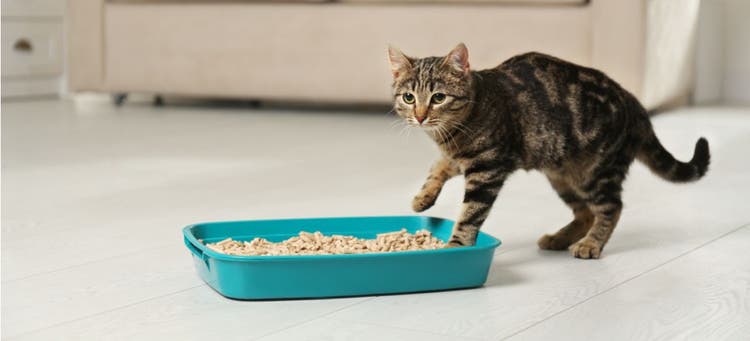
Can Dirty Litterboxes Make You Sick?
Nobody likes scooping up dirty cat litter, but putting off this unpleasant chore can make life much more difficult for cats and their pet parents. Even a healthy cat’s litterbox can become a breeding ground for parasites and bacteria. When cats are suffering from infections, their litterboxes can become even more unpleasant, harboring a number of human health risks.
3 Ways Your Cat’s Litterbox Could Make You Sick
Unpleasant odors aren’t the only reason to practice diligent litter box management. Contaminated litter or cat feces could expose owners to infection-causing pathogens, which may lead to serious health conditions.
Toxoplasmosis
It’s estimated that more than 40 million Americans are currently infected with toxoplasmosis, a zoonotic disease caused by a parasite known as Toxoplasma gondii (T. gondii). Most infected individuals don’t know they’ve come in contact with the bacteria, but those who do can suffer a variety of symptoms of variable severity. Cases of toxoplasmosis could lead to flu-like symptoms, vision problems, and seizures. Certain studies have suggested that T. gondii can lead to cognitive difficulties like memory loss and cause infected people to develop a rare condition called intermittent explosive disorder.
You’ve probably heard that pregnant women should exercise caution around litterboxes. Toxoplasmosis is to blame for these grave warnings. Pregnant women who contract toxoplasmosis may miscarry or experience additional complications. For example, some newborns from infected mothers experience severe brain and eye defects at birth. Many others develop symptoms of toxoplasmosis as they age.
Anyone with compromised or vulnerable immune systems, including pregnant women and individuals undergoing chemotherapy, should take care to wear gloves while handling cat feces and wash their hands thoroughly with soap and water afterward. If possible, these populations should consider avoiding their cat’s litterboxes altogether.
Campylobacteriosis
This bacterial infection is among the most common causes of diarrhea in the United States, affecting over a million people each year. Some of these individuals develop the condition by consuming raw meat, poultry, or dairy, while others encounter Campylobacter thanks to contaminated cats who’ve shed the nasty pathogen in their feces. Infection can be especially dangerous for pet owners with weak immune systems, such as those with HIV or who’ve recently undergone organ transplants.
Salmonellosis
Like their owners, cats can become infected with the Salmonella bacteria by eating or otherwise encountering contaminated food. Among the most common culprits are raw and undercooked poultry and eggs. Outdoor cats may ingest the bacteria by consuming animals they’ve hunted. Once they’re infected, pet cats can shed Salmonella in their feces, potentially exposing owners. Though most infections turn out benign and do not cause any symptoms, serious infections can prove harrowing, resulting in symptoms like fever and severe diarrhea. As with other bacterial infections, reactions are generally worse in pets and people with weakened immune responses.
A Dirty Litterbox and Your Cat
Unclean litterboxes can make cats sick too. Felines can be finnicky about cleanliness (as their near-constant grooming makes plain) and some will steer clear of dirty litterboxes. Holding in urine can lead to a host of health conditions for cats, potentially impacting the kidneys, urinary tract, and bladder. Alternatively, cats may look for new places around the house to replace their out-of-service litterboxes. That means neglecting to clean the litterbox can leave you with many more messes on your hands (and floor, and furniture).
Keeping You and Your Cat Safe
- Scoop every day and clean every week: Add litter scooping to your daily routine and plan on thoroughly washing out the litterbox with soap and water every week.
- Know your cat: Make sure your cat’s litterbox is suited to their size, age, and temperament. Cats who tend to be messy may require an especially large or tall box to avoid litter-strewn floors.
- Keep cats indoors: Outdoor cats run a greater risk of contracting illnesses and potentially bringing them home to you and your family. If possible, keep cats indoors to discourage hunting and keep them safe from disease-causing pests.
More Litterbox Guides
- Litterboxes: What You Should Know
- The Fine Art of Litterbox Care
- Introducing a New Kitten to the Litterbox